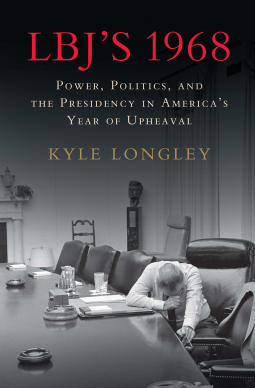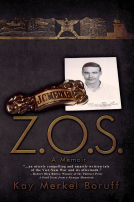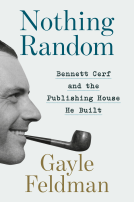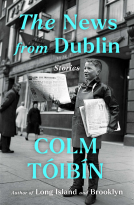
LBJ's 1968
Power, Politics, and the Presidency in America's Year of Upheaval
by Kyle Longley
This title was previously available on NetGalley and is now archived.
Send NetGalley books directly to your Kindle or Kindle app
1
To read on a Kindle or Kindle app, please add kindle@netgalley.com as an approved email address to receive files in your Amazon account. Click here for step-by-step instructions.
2
Also find your Kindle email address within your Amazon account, and enter it here.
Pub Date Apr 01 2018 | Archive Date Jun 13 2018
Talking about this book? Use #Lbj's1968 #NetGalley. More hashtag tips!
Description
1968 was an unprecedented year in terms of upheaval on numerous scales: political, military, economic, social, cultural. In the United States, perhaps no one was more undone by the events of 1968 than President Lyndon Baines Johnson. Kyle Longley leads his readers on a behind-the-scenes tour of what Johnson characterized as the 'year of a continuous nightmare'. Longley explores how LBJ perceived the most significant events of 1968, including the Vietnam War, the assassinations of Martin Luther King, Jr and Robert Kennedy, and the violent Democratic National Convention in Chicago. His responses to the crises were sometimes effective but often tragic, and LBJ's refusal to seek re-election underscores his recognition of the challenges facing the country in 1968. As much a biography of a single year as it is of LBJ, LBJ's 1968 vividly captures the tumult that dominated the headlines on a local and global level.
Advance Praise
Advance praise: 'Countless historians have picked apart 1968, but Kyle Longley is the first to go inside the head of the man who, more than anyone else, defined that year - and with a style and precision that somehow makes an account of a terrible time a joy to read.' Clay Risen, The New York Times
Advance praise: '1968 was a turbulent year in our country and a year when President Lyndon Johnson encountered what seemed like an endless series of crises. Kyle Longley has depicted the tone of the times and captured the dilemmas and decisions of LBJ in this compelling book that should be read by any student of that eventful year.' Larry Temple, Special Counsel to President Lyndon Johnson in 1968, Chairman of the LBJ Foundation
Advance praise: 'Like King Lear, Lyndon Johnson gave away his power before the end of the play. Kyle Longley's Texas-size epic reveals the tragedy, comedy, pathos, and heroism in the extraordinary events that followed that fateful year, 1968, as seen through the eyes of an American giant.' Elizabeth Cobbs, author of American Umpire
Advance praise: 'From the Pueblo crisis to the Chennault affair, 1968 was a year like no other, and Kyle Longley's fast-paced, richly detailed narrative splendidly captures the ups - and mostly downs - from the vantage point of LBJ's White House.' George C. Herring, author of The American Century and Beyond
Advance praise: 'Kyle Longley has penned a vivid and insightful portrait of one of the most tumultuous and significant years in American history.' Randall B. Woods, University of Arkansas
Advance praise: 'Kyle Longley offers an insightful portrayal of arguably the most complex American president of the Cold War era. What emerges is a fresh appraisal of Lyndon Johnson, a tragic figure contesting the forces of history. In an innovative biographical approach, Longley takes us inside LBJ's White House during the tumultuous year of 1968. An outstanding work by a master storyteller.' Gregory A. Daddis, Chapman University, California
Available Editions
| EDITION | Hardcover |
| ISBN | 9781107193031 |
| PRICE | $29.99 (USD) |
Average rating from 11 members
Featured Reviews
 Joseph S, Reviewer
Joseph S, Reviewer
LBJ's 1968: Power, Politics, and the Presidency in America's Year of Upheaval by Kyle Longley is a detailed history of one year of the presidency of a longtime politician. Longley is the Snell Family Dean's Distinguished Professor of History and Political Science at Arizona State University and author of Grunts: The American Combat Soldier in Vietnam and In the Eagle's Shadow: The United States and Latin America.
Lyndon Baines Johnson was a complex person. He was fifty-five when he found himself thrust into the presidency. It was rumored that he would be dropped from the Kennedy ticket in 1964. For a Texas Democrat at the time, Johnson was unusual. He worked as a day laborer and taught at a segregated Mexican-American school in Cotulla, Texas. Under his gruff exterior and mannerisms was someone who wanted to end poverty, but ended up having his presidency defined by war.
There is no lack of biographies on Johnson. Caro's The Years of Lyndon Johnson is probably best known for its great detail. Rather than focus on the entire life of the former president Longley concentrates on the final full year of the Johnson presidency. 1968, the final full year, was a year unlike any other in history. Vietnam was distracting the public, before and continued to do so but now other events seemed to even overwhelm the war.
Longley starts with the 1968 State of the Union Address and follows along with events of the year. The State of the Union Address may have shocked the nation but Johnson decided to hold off on his announcement not to seek another term. The US was deficit spending with Vietnam and The Great Society competing for funds. Johnson originally saw the prosperity of the US as a time to help eliminate poverty and expand on civil rights. He felt the fruits of the country's prosperity should be enjoyed by all. Just six days after the State of the Union Address North Korea seized the USS Pueblo and its crew. This event would drag on until December 1968. A small nation was able to cripple any response from a superpower. It became a deep embarrassment to US power and prestige.
In March, LBJ announced his intention not to seek reelection. That announcement was quickly followed by the assassination of both Martin Luther King and Robert Kennedy. King's assassination brought violence to many cities as people reacted and rioted. Gun violence killed JFK, MLK, and Robert Kennedy. Johnson worked to restrict gun sales, particularly through mail order. Guns were a source of great violence in the US including the University of Texas Tower shooting in 1966. Johnson's role in restricting gun violence as well as the Great Society program was stifled by his self-inflicted lame duck presidency.
Johnson's foreign policy also suffered. The US stood by helplessly as Soviet troops moved into Czechoslovakia. Attempts to make peace in Vietnam were also hindered when it appeared that Nixon persuaded South Vietnam to wait until his election rather than make a deal with LBJ. Johnson had evidence of Nixon's meddling but did not pursue it preferring not to sully the office of the president or appear to be playing in dirty politics.
As the election approached, the Democrats were in disarray. Their convention was a scene of violence. Hawks and doves splintered the party as well as the deep south that did not support the civil rights movement. Johnson did not attend the convention and was barely mentioned. Humphrey lost a close popular vote to Nixon. Wallace took the deep south from the Democrats allowing an easy electoral college victory for Nixon. Johnson again was helpless. He wanted to be known for the Great Society and for creating peace. Instead, he is remembered by most for the Vietnam War and the national guard in American streets in Selma, Chicago, Detriot, Washington, DC, and Baltimore -- the most deployments of any president since the Armed Forces Reserve Act.
Johnson served in troubled times and the times took a toll on the man. Longley shows that despite the troubles Johnson was a man who deeply cared. He was pained by American losses in Vietnam. He cared about the poor and ending poverty. He wanted to project America's power and democracy around the world. He met adversity in almost everything he attempted. It took a toll on the man and was probably responsible for his early death. Johnson died of a heart attack at the age of 64, almost exactly four years after handing over the presidency to Richard Nixon. An excellent snapshot of a great American politician.
 Reviewer 153322
Reviewer 153322
Pushing in closely on LBJ, Longley leads the reader through 1968--the seizing of the Pueblo, the assassinations of MLK and RFK, the decision not to run again, Tet and the Democratic Convention. Longley manages, in a tightly focused book, to give just enough context for events to understand them, but not to lose the day to day beats of life at the center of power. Deeply informed by the diaries and memoirs of the principal participants, if you could lurk in the background of White House meetings, this is what you would see unfolding, in the political future of the nation, and in the relationships of the human beings who were attempting to make the least bad decisions. About to leave for a staff ride in Vietnam, it was useful to be reminded that in 1968, both LBJ's sons-in-law were in uniform and deployed.
 Cristie U, Book Trade Professional
Cristie U, Book Trade Professional
This book was well researched and written. It was really interesting, as I thought I knew a lot about LBJ. This book provided me with new information. Definitely recommend for anyone that likes political history and trivia!
LBJ's 1968 by Kyle Longley caught my interest right away. I have been reading about President Johnson ever since Doris Kearns Goodwin's book LBJ and the American Dream came out.
LBJ has fascinated me for the complexity of his character. He was a truly empathetic man who strove to better the lives of Americans. He understood power and how to use it. He could be cruel and undignified. And he was blind to his own flaws.
While contending with one crisis after another, Longley shows how President Johnson's strength under pressure and thoughtful consideration helped him deal successfully with the U.S.S. Pueblo while his fatal flaw, a prideful lack of self-examination and denial of error, led to his failure to end the war in Vietnam.
LBJ abused his power regarding Supreme Court nominations, which the Republicans would not approve, setting a dangerous precedent. Johnson was unwilling to give over party leadership, negatively impacting the Democratic platform and Vice President Humphrey's campaign.
But he also responded to the death of Rev. King and the resulting rioting across the nation with empathy and understanding, pushing the 1968 Fair Housing Act.
LBJ had supported gun control ever since the assassination of President Kennedy. In February 1968 he submitted the Safe Streets and Crime Control Bill. He wanted to ban mail order sales, interstate sales, sales to prison inmates, and sales to minors--but the NRA opposition squashed the bills. And a few weeks later, RFK was shot. The president proposed a commission on violence.
"My fellow citizens, we cannot, we just must not, tolerate the sway of violent men among us. We must not permit those who are filled with hatred...to dominate our streets and fill our homes with fear...Let us put an end to violence and to the preaching of violence. Let the Congress pass laws to bring the insane traffic in guns to a halt, as I have appealed to them time and time again to do. That will not, in itself, end the violence, but reason and experience tell us that it will slow it down; that it will spare many innocent lives."
The Gun Control Act of 1968 did end mail order sales, sales to minors, and importation of guns but failed on licensing and registration.
When the Nixon camp secretly worked to stall Johnson's peace talks, Johnson elected to suppress the evidence rather than create a crisis if the president-elect was outed as treasonous. As Longly points out, that crisis was only delayed until the Watergate break-in was discovered.
As if the Vietnam war and problems of Communist China were not enough, LBJ had to respond to the 1968 Soviet invasion of Czechoslovakia.
Every issue we deal with today can find its twin in 1968. I enjoyed both the in-depth story of 1968 both as history and as a revelation of how we "got to here."
The Republican response to Civil Rights, Environmentalism, and the Great Society was immediate; the dismantling Johnson's legacy, even the publicly popular programs, continues to this day. We have a renewal of racial tension and hate groups. We still struggle with Southeast Asia, China, and the Soviets.
I found LBJ's 1968 to be an emotional as well as intellectual read, as both a snapshot in time and informing today's political scene. I would recommend it to those interested in American history, presidential history, and also to those of us who grew up during this time period.
I received a free ebook from the publisher through NetGalley in exchange for a fair and unbiased review.
 Dawn W, Reviewer
Dawn W, Reviewer
Fabulous. Well written documentary of the events of 1968 the defining year of LBJs presidency. Very informative and remembering of facts and accounts.
 Jillian L, Reviewer
Jillian L, Reviewer
The tumultuousness of 1968 is well known and has been documented in various books, many times. However, Longley’s focus on the year through the eyes of LBJ is fascinating.
Having read numerous books about President Johnson, I’ve never truly gotten a sense of what the job of President was like day to day, beginning with the assassination of President Kennedy, and concluding with the inauguration of President Nixon.
This book delves deeply into all areas of the Johnson presidency and the various crises facing the 36th President. I thoroughly enjoyed it.


















